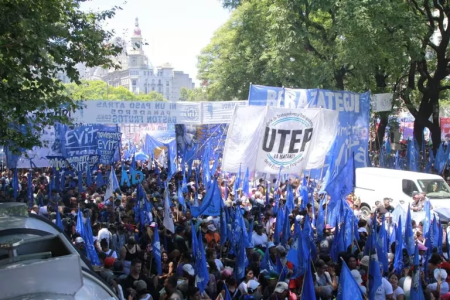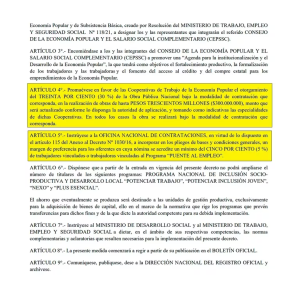monkey
New member
Piqueteros benefited from the fall of the Omnibus Law: the trust fund that the Government sought to control and that finances cooperatives - Infobae

Source:

 www.infobae.com
www.infobae.com
February 14, 2024
This is the Socio-Urban Integration Fund (FISU) to which, in 2023, it awarded almost 60 billion pesos, the sixth in importance. Of that total, the cooperatives that depend on the Popular Economy Workers Union (UTEP) received about six billion pesos for the urbanization of popular neighborhoods.
By Andres Klipphan

UTEP MARCH CGT JANUARY 24
The fall of the Omnibus Law in parliament prevents Javier Milei - at least for now - from managing at his discretion the $1.5 billion distributed through at least 29 trusts . The governors, and other sectors, who strongly opposed the approval of subsection “h” of article 4 of the project that granted the president “to transform, modify, unify or eliminate specific allocations, trusts or public trust funds created by regulations with legal status, including those intended for subsidies, review their origin and destination to achieve greater rationality, efficiency, effectiveness, transparency and control of the use of public resources.”
The government of La Libertad Avanza understands that this fortune, which represents almost two percentage points of the country's Gross Domestic Product (GDP), is a “black box” that has little or no controls and that was defended tooth and nail by “the caste” so as not to lose their “privileges” that they obtain through them. Among the funds questioned is the Socio-Urban Integration Fund (FISU) .
The piquetero organizations and Peronist social movements actively demonstrated so that the deputies did not approve this section, since they, through their cooperatives, receive 9% of those funds intended to promote the socio-urban integration of settlements registered in the National Registry of Popular Neighborhoods, and which include lands owned by the National State, the provinces or municipalities transferred for that purpose.
Some of those “given” properties were due to mega land seizures, as occurred in Los Hornos, in La Plata.
Social movements in the Congress Square while the Chamber of Deputies debates in particular the Omnibus Law (Franco Fafasuli)
Data from the Ministry of Finance reveals that, as of September 2023 - the latest data published - $58,010 million were transferred to the Socio-Urban Integration Fund , the sixth largest. The first is the Transportation Infrastructure System, which, on the same date, had transfers of 441,241,394,679.
During Alberto Fernández 's administration , the FISU was under the responsibility of the Ministry of Social Development, and was administered by the Secretariat of Territorial Development and Habitat, and with BICE as trustee.
The secretary of Socio-Urban Integration, who had the National Registry of Popular Neighborhoods and the FISU under her orbit, was Fernanda Miño , the social leader of the Excluded Workers Movement (MTE), the organization that has the former presidential candidate of Unión por la Patria, Juan Grabois as one of its greatest references and currently led by Nicolás Corapresi .
The Socio-Urban Integration Fund was created by Decree 819/2019 at the end of the Mauricio Macri government as defined in Law 27,453, and “its main objective is to finance socio-urban integration projects for the Popular Neighborhoods that are located registered in the National Registry of Popular Neighborhoods (ReNaBaP) and the creation of lots with services”, as written on its website and which now depends on the Ministry of Human Capital, headed by Sandra Pettovello . “The works to be carried out in the Popular Neighborhoods must be awarded, at least 25%, to work cooperatives or other associative groups of the popular economy integrated, preferably, by the residents of the neighborhoods . ”

Alberto Fernández signed decree 728/2022 that benefited the social movements that make up UTEP (FACEBOOK UTEP)
These cooperatives, with minimal exceptions, like some left-wing organizations, belong to the social movements grouped in the Popular Economy Workers Union (UTEP), made up, among others, of Emilio Pérsico's Evita and Somos/ Barrios de Pie, referenced in Daniel Menendez both Social Development officials during the Fernández administration; the MTE of lawyer Juan Grabois; the Classist and Combative Current (CCC) of former national deputy Juan Carlos Alderete - former member of the Frente de Todos bench, current Union for the Homeland; and, among others, by the Francisco Missionaries Movement, led by Esteban “Gringo” Castro , former secretary general of the UTEP and leader of Evita.
It may interest you:Javier Milei decided to deepen his offensive against the governors and will put a stop to the fiscal pact
On November 4, 2022, Alberto Fernández, who governed the four years of his mandate allied with the social movements that draw on the different aspects of Peronism (Kirchnerism included), signed decree 728/2022 .
To this extent, the president put an end to the new incorporations to the Empower Work plan, but, at the same time, promoted in favor of the “Work Cooperatives of the Popular Economy” the granting of 30% of the public works, under the modality of contracting that corresponds to amounts of $300 million or less.
This amount is clarified, “ it will be updated as provided by the enforcement authority, and taking the specialties of the cooperatives as indicative.”
Fernández also instructed the National Contracting Office to incorporate as part of the evaluation of bidders for public works a margin of preference for those who can prove that 5% of their workers are linked through the “Bridge to Employment” program. a Government initiative to “transform social plans into genuine work.”
That is, it directly benefited the work cooperatives of the social movements that were part of the government or related to it with million-dollar sums.
Left-wing organizations generally do not have cooperatives, which is why the vast majority did not qualify for that benefit.

Alberto Fernández's decree that benefits piquetera cooperatives with public works
FISU funds are fed by the PAIS tax that was dictated through law 27,541. The rate is 30% in the case of the purchase of foreign currency, debit and credit card expenses in foreign currency, and tourist services abroad. However, the percentage varies depending on the type of operation carried out or the service consumed.
Article 42 of that provision defines how the Executive Branch must distribute the proceeds of said tax: 70% allocated to ANSES and PAMI programs and benefits. And 30% to be distributed among the FISU, economic infrastructure works and the promotion of national tourism.
Said law was complemented, among others, by Decree 184/2020 in which the Executive, within the framework of the article cited above, defines that 30% be divided as follows: 30% to the Socio-Urban Integration Fund , 65% to economic infrastructure works and 5% to the promotion of national tourism.
That is, 9% of the total tax is allocated to the Socio-Urban Integration Fund. This was, in 2023, almost six billion pesos .
The days prior to the treatment of the Omnibus Law in the Lower House, the UTEP and its main leaders campaigned against Milei's intention to take full control of the trusts, among them, those of the FISU.

Javier Milei failed to impose the Omnibus Law in the Chamber of Deputies and withdrew the project from Parliament EFE/EPA/GIAN EHRENZELLER
“Article 211 and 6 of the Omnibus Law plans the elimination of the specific allocation to the financing of the socio-urban integration policy. Popular neighborhoods cannot be improved without the tool of financing,” UTEP described through its social networks. And they reported that: “There are currently 6,467 popular neighborhoods in ReNaBaP” and describes that in each of these places “more than 1,200,000 families live”, that is, more than four million people.
Milei wanted to use these funds, part of which were derived from social movement cooperatives, and which were part of “section h,” to manage them at his convenience.
After more than 50 hours of debate, it was clear that they were the economic key behind the failure of the Omnibus Law and to which the governors, and also the Peronist picketers, cling.

Source:

Piqueteros se beneficiaron con la caída de la Ley Ómnibus: el fondo fiduciario que el Gobierno buscaba controlar y que financia cooperativas
Se trata del Fondo de Integración Socio Urbana (FISU) al que, en 2023 le adjudicó casi 60 mil millones de pesos, el sexto en importancia. De ese total, las cooperativas que dependen de la Unión Trabajadores de la Economía Popular (UTEP) recibieron unos seis mil millones de pesos para la...
February 14, 2024
This is the Socio-Urban Integration Fund (FISU) to which, in 2023, it awarded almost 60 billion pesos, the sixth in importance. Of that total, the cooperatives that depend on the Popular Economy Workers Union (UTEP) received about six billion pesos for the urbanization of popular neighborhoods.
By Andres Klipphan

UTEP MARCH CGT JANUARY 24
The fall of the Omnibus Law in parliament prevents Javier Milei - at least for now - from managing at his discretion the $1.5 billion distributed through at least 29 trusts . The governors, and other sectors, who strongly opposed the approval of subsection “h” of article 4 of the project that granted the president “to transform, modify, unify or eliminate specific allocations, trusts or public trust funds created by regulations with legal status, including those intended for subsidies, review their origin and destination to achieve greater rationality, efficiency, effectiveness, transparency and control of the use of public resources.”
The government of La Libertad Avanza understands that this fortune, which represents almost two percentage points of the country's Gross Domestic Product (GDP), is a “black box” that has little or no controls and that was defended tooth and nail by “the caste” so as not to lose their “privileges” that they obtain through them. Among the funds questioned is the Socio-Urban Integration Fund (FISU) .
The piquetero organizations and Peronist social movements actively demonstrated so that the deputies did not approve this section, since they, through their cooperatives, receive 9% of those funds intended to promote the socio-urban integration of settlements registered in the National Registry of Popular Neighborhoods, and which include lands owned by the National State, the provinces or municipalities transferred for that purpose.
Some of those “given” properties were due to mega land seizures, as occurred in Los Hornos, in La Plata.
Social movements in the Congress Square while the Chamber of Deputies debates in particular the Omnibus Law (Franco Fafasuli)
Data from the Ministry of Finance reveals that, as of September 2023 - the latest data published - $58,010 million were transferred to the Socio-Urban Integration Fund , the sixth largest. The first is the Transportation Infrastructure System, which, on the same date, had transfers of 441,241,394,679.
During Alberto Fernández 's administration , the FISU was under the responsibility of the Ministry of Social Development, and was administered by the Secretariat of Territorial Development and Habitat, and with BICE as trustee.
The secretary of Socio-Urban Integration, who had the National Registry of Popular Neighborhoods and the FISU under her orbit, was Fernanda Miño , the social leader of the Excluded Workers Movement (MTE), the organization that has the former presidential candidate of Unión por la Patria, Juan Grabois as one of its greatest references and currently led by Nicolás Corapresi .
The Socio-Urban Integration Fund was created by Decree 819/2019 at the end of the Mauricio Macri government as defined in Law 27,453, and “its main objective is to finance socio-urban integration projects for the Popular Neighborhoods that are located registered in the National Registry of Popular Neighborhoods (ReNaBaP) and the creation of lots with services”, as written on its website and which now depends on the Ministry of Human Capital, headed by Sandra Pettovello . “The works to be carried out in the Popular Neighborhoods must be awarded, at least 25%, to work cooperatives or other associative groups of the popular economy integrated, preferably, by the residents of the neighborhoods . ”

Alberto Fernández signed decree 728/2022 that benefited the social movements that make up UTEP (FACEBOOK UTEP)
These cooperatives, with minimal exceptions, like some left-wing organizations, belong to the social movements grouped in the Popular Economy Workers Union (UTEP), made up, among others, of Emilio Pérsico's Evita and Somos/ Barrios de Pie, referenced in Daniel Menendez both Social Development officials during the Fernández administration; the MTE of lawyer Juan Grabois; the Classist and Combative Current (CCC) of former national deputy Juan Carlos Alderete - former member of the Frente de Todos bench, current Union for the Homeland; and, among others, by the Francisco Missionaries Movement, led by Esteban “Gringo” Castro , former secretary general of the UTEP and leader of Evita.
It may interest you:Javier Milei decided to deepen his offensive against the governors and will put a stop to the fiscal pact
On November 4, 2022, Alberto Fernández, who governed the four years of his mandate allied with the social movements that draw on the different aspects of Peronism (Kirchnerism included), signed decree 728/2022 .
To this extent, the president put an end to the new incorporations to the Empower Work plan, but, at the same time, promoted in favor of the “Work Cooperatives of the Popular Economy” the granting of 30% of the public works, under the modality of contracting that corresponds to amounts of $300 million or less.
This amount is clarified, “ it will be updated as provided by the enforcement authority, and taking the specialties of the cooperatives as indicative.”
Fernández also instructed the National Contracting Office to incorporate as part of the evaluation of bidders for public works a margin of preference for those who can prove that 5% of their workers are linked through the “Bridge to Employment” program. a Government initiative to “transform social plans into genuine work.”
That is, it directly benefited the work cooperatives of the social movements that were part of the government or related to it with million-dollar sums.
Left-wing organizations generally do not have cooperatives, which is why the vast majority did not qualify for that benefit.

Alberto Fernández's decree that benefits piquetera cooperatives with public works
FISU funds are fed by the PAIS tax that was dictated through law 27,541. The rate is 30% in the case of the purchase of foreign currency, debit and credit card expenses in foreign currency, and tourist services abroad. However, the percentage varies depending on the type of operation carried out or the service consumed.
Article 42 of that provision defines how the Executive Branch must distribute the proceeds of said tax: 70% allocated to ANSES and PAMI programs and benefits. And 30% to be distributed among the FISU, economic infrastructure works and the promotion of national tourism.
Said law was complemented, among others, by Decree 184/2020 in which the Executive, within the framework of the article cited above, defines that 30% be divided as follows: 30% to the Socio-Urban Integration Fund , 65% to economic infrastructure works and 5% to the promotion of national tourism.
That is, 9% of the total tax is allocated to the Socio-Urban Integration Fund. This was, in 2023, almost six billion pesos .
The days prior to the treatment of the Omnibus Law in the Lower House, the UTEP and its main leaders campaigned against Milei's intention to take full control of the trusts, among them, those of the FISU.

Javier Milei failed to impose the Omnibus Law in the Chamber of Deputies and withdrew the project from Parliament EFE/EPA/GIAN EHRENZELLER
“Article 211 and 6 of the Omnibus Law plans the elimination of the specific allocation to the financing of the socio-urban integration policy. Popular neighborhoods cannot be improved without the tool of financing,” UTEP described through its social networks. And they reported that: “There are currently 6,467 popular neighborhoods in ReNaBaP” and describes that in each of these places “more than 1,200,000 families live”, that is, more than four million people.
Milei wanted to use these funds, part of which were derived from social movement cooperatives, and which were part of “section h,” to manage them at his convenience.
After more than 50 hours of debate, it was clear that they were the economic key behind the failure of the Omnibus Law and to which the governors, and also the Peronist picketers, cling.

